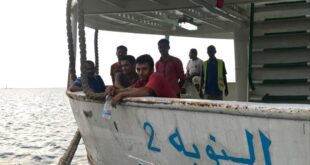Civilian Targeting Trends in the Central African Republic and Mali
Introduction
On 30 March 2022, the Foreign Affairs Committee of the UK Parliament launched an inquiry into states’ use of private military contractors (PMC), drawing particular attention to the prominent Russian PMC known as the Wagner Group (UK Parliament, 30 March 2022). The decision to launch the inquiry came as Wagner Group forces deployed to Ukraine, and a series of reports emerged implicating Wagner mercenaries in human rights violations in Mali.
This was only one of the latest efforts to investigate the Wagner Group’s activities. Past initiatives came amid heightened international concern over Wagner Group operations in the Central African Republic (CAR). Multiple UN bodies have previously tabled concerns or opened investigations into alleged abuses perpetrated by Wagner mercenaries (UN Security Council, 25 June 2021; UN Info, 31 March 2021). In June 2021, the UN Panel of Experts on CAR tabled reports of “indiscriminate killings” and violence against civilians at the hands of “Russian instructors” to the UN Security Council (UN Security Council, 25 June 2021). The UN peacekeeping mission in CAR (MINUSCA) and Rwandan special forces have also expressed concerns about joint operations with Wagner over alleged human rights violations (UN Info, 31 March 2021; Corbeau News, 13 June 2021). Moreover, the European Union (EU) imposed sanctions on the Wagner Group and Wagner-linked individuals in December 2021 (European Council, 13 December 2021).
In light of growing concerns about Wagner’s activities in Mali and their deployment in Ukraine, this report analyzes ACLED data on the group’s engagement in political violence in recent years. It focuses on civilian targeting by the Wagner Group in CAR and Mali, where they have operated alongside state forces since 2018 and 2021, respectively. Analysis of the data reveals several clear trends:
Key Trends
- The Wagner Group engages in high levels of civilian targeting in both CAR and Mali. Civilian targeting accounts for 52% and 71% of Wagner involvement in political violence in CAR and Mali, respectively. In both cases, this exceeds the rate of civilian targeting perpetrated by allied state forces, as well as the major insurgent groups operating in each context.
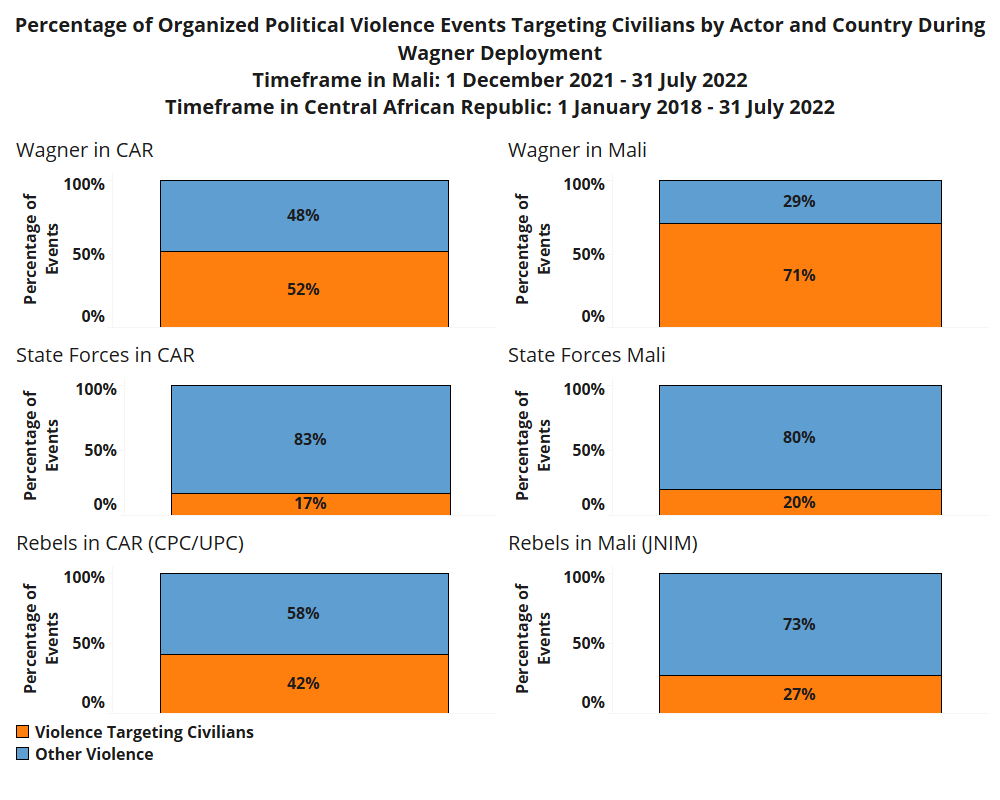
- In CAR, the Wagner Group has increasingly operated independently of the Central African Armed Forces (FACA) from mid-2021 after initial operations to regain territory from rebel groups. While Wagner Group mercenaries continue to play an important role in training FACA and coordinating FACA activities, they have operated independently of state forces in at least 50% of political violence events each month since May 2021, except October 2021 and April and June 2022.
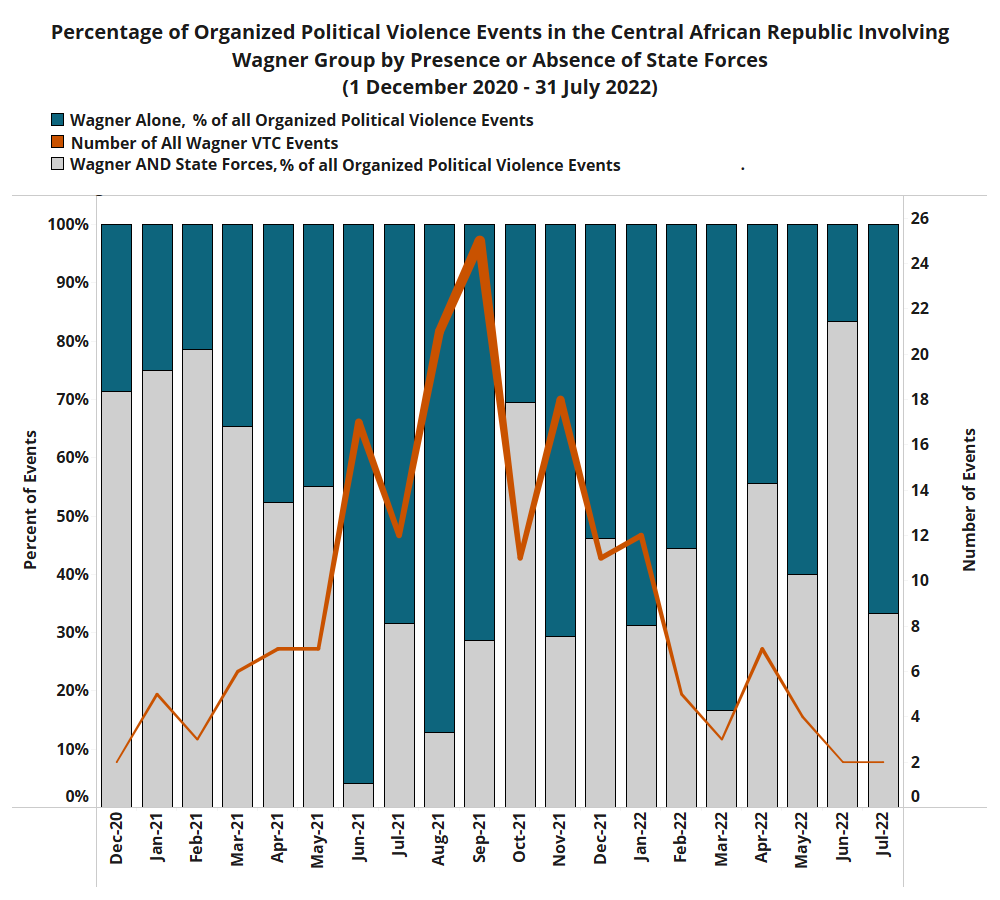
- When operating independently in CAR, Wagner mercenaries have engaged in a disproportionately higher level of violence targeting civilians than when they have operated alongside state forces. Since December 2020, 70% of Wagner events without the presence of state forces have been acts of civilian targeting, compared to 27% when Wagner mercenaries have operated alongside state forces.
- In Mali, by contrast, the Wagner Group has mostly operated alongside state forces — driving an increase in civilian targeting involving state forces. ACLED records approximately 500 civilian fatalities resulting from joint operations involving Wagner and Malian state forces.
These trends not only point to the heightened risk that Wagner Group forces pose to civilians through both targeted killings and opportunistic attacks. They also highlight the manner in which states accept and exploit these activities as part of wider counter-insurgency operations in already complex conflict environments.
Wagner Deployments Around the World
The Wagner Group is one of the most well-known and prolific PMCs in the world. Nevertheless, exact details about the group are difficult to confirm, with its organizational structure remaining deliberately obscure. The Wagner Group does not officially exist, with the name instead applied to an overlapping network of businesses and private military forces that are believed to enjoy the implicit but unrecognized support of the Russian state (Foreign Policy, 6 July 2021).1
In recent years, the Wagner Group has actively engaged in conflicts across multiple countries in Africa and the Middle East, including Syria, Libya, Mozambique, and CAR. Reports also suggest that they have engaged in activities in the Democratic Republic of Congo, Angola, Madagascar, Zimbabwe, and Sudan (Africanews, 22 March 2022), with operations in up to 30 countries across the world (Center for Strategic & International Studies, September 2020).
Most recently, Wagner Group forces have also engaged in operations in Mali and Ukraine (VOA News, 20 January 2022; Reuters, 28 March 2022) (for more on the ongoing Russian invasion of Ukraine, see ACLED’s Ukraine Crisis Hub). Much like earlier and ongoing deployments, their activities have been deliberately obscured in these contexts. The Malian military junta has denied that Wagner forces are operating in the country, though it has acknowledged the presence of Russian military trainers (Al Jazeera, 20 April 2022). Meanwhile, Russian Foreign Minister Sergei Lavrov has acknowledged the presence of Wagner in Mali (Africanews, 3 May 2022), as have French and American officials (Bloomberg, 11 March 2022).
Specific acts of Wagner violence during the ongoing Russian invasion of Ukraine have been difficult to identify. However, international intelligence sources have widely reported on their deployment as part of the invasion (Reuters, 28 March 2022), with German intelligence officials directly accusing them of engaging in deadly incidents of civilian targeting (Washington Post, 7 April 2022). Recently, reports have implicated Wagner forces in an explosion in late July that left more than 50 Ukrainian prisoners of war dead at a prison building in occupied Olenivka in the Donetsk region. Reports also indicate that Wagner has diverted active forces to Ukraine to support Russian maneuvers, reportedly withdrawing significant troop numbers from CAR and Libya (HumAngle, 21 March 2022; Middle East Eye, 28 April 2022).
While these deployments remain in their relative infancy, the Wagner Group has already engaged in multiple high-fatality attacks on civilian populations in Mali. When viewed alongside Wagner’s exertion of control in former rebel-held regions through mass targeted killings and opportunistic attacks on civilian populations in CAR, there are further worrying signs for the future trajectories of both deployments.
The Wagner Group in the Central African Republic
The Wagner Group first began operating in CAR in 2018 after the CAR and Russian governments signed an agreement exchanging Russian military support and weapons for lucrative mining concessions (CNN, 15 June 2021; International Crisis Group, 3 December 2021). The deal paved the way for Russian “military instructors” — including Wagner-linked trainers — to enter the country alongside large quantities of weapons following the UN Security Council’s decision to waive a pre-existing weapons embargo on CAR (CNN, 15 June 2021). While Wagner did not engage directly in combat operations at this time, specific international concerns about their alleged involvement in human rights abuses emerged as early as 2019. In January 2019, the UN launched an investigation into alleged torture committed by Wagner forces of a man accused of belonging to an armed group (AFP, 12 February 2019).
In late 2020, Wagner’s operations in CAR changed dramatically, morphing from a support and training role to a direct combat role as the security situation deteriorated ahead of elections in late December. The deteriorating security situation came as a coalition of militias — grouped as the Coalition of Patriots for Change (CPC)2and led by former President François Bozizé — launched an offensive across CAR to overthrow the government of President Faustin-Archange Touadéra. Bozizé formed the CPC after the Constitutional Court rejected his presidential candidacy (International Institute for Strategic Studies, 2021). In rejecting his candidacy, the Constitutional Court found that Bozizé failed to fulfill “good morality” requirements, citing UN sanctions and an international arrest warrant for alleged war crimes (Al Jazeera, 3 December 2020).
During an offensive between December 2020 and January 2021, CPC-aligned militias gained territory in Haut-Mbomou, Lobaye, Mbomou, Nana-Gribizi, Nana-Mambere, Ombella-M’Poko, Ouaka, and Ouham-Pende. By January 2021, CPC-aligned militias controlled about two-thirds of the country (African Research Bulletin, 16 February 2021). In response to this early advance of the CPC, Wagner mercenaries were deployed to directly engage in operations alongside FACA, MINUSCA, and Rwandan special forces.
After joining state forces in actively fighting against the CPC in December 2020, the Wagner Group became one of the dominant agents of political violence in CAR. Of all political violence that ACLED records between December 2020 and July 2022 in CAR, nearly 40% of events involve the Wagner Group. During this time, Wagner forces engaged in political violence in all prefectures in CAR except Haut-Mbomou and Sangha-Mbaeré (see map below).
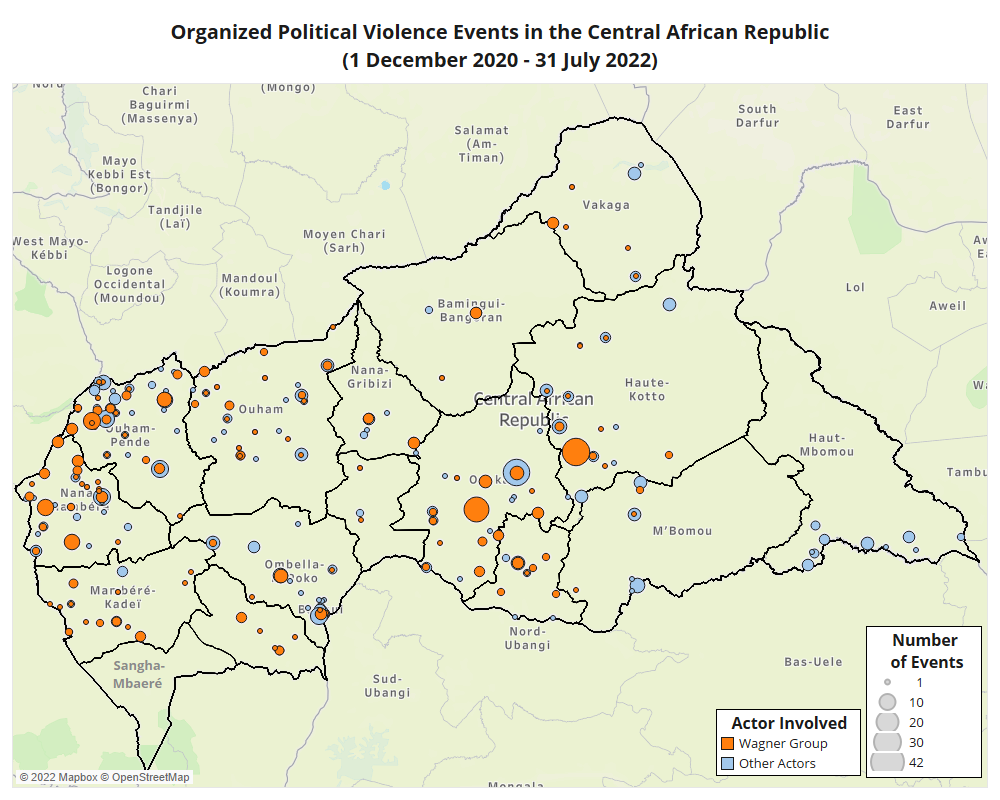
While remaining at relatively low levels during the initial phase of CPC expansion, Wagner’s activity rose significantly in the first quarter of 2021 amid counter-offensives to reclaim rebel-held territory. During this early phase of fighting, Wagner primarily engaged in political violence alongside state forces. By May 2021, the FACA and allied forces, including the Wagner Group, had regained much of the area that had fallen into CPC control.
These gains precipitated a change in Wagner operations, with Wagner Group and state forces activity diverging significantly. Since peaking in January 2021, FACA activity has steadily decreased, aside from spikes in July 2021, when state forces launched a series of fresh operations against rebels, and October 2021, when the CPC launched a series of offensives. Contrastingly, Wagner activity did not peak until September 2021, with heightened levels of engagement in political violence between March and November 2021. Notably, Wagner Group mercenaries operated independently of state forces in at least 50% of political violence events each month since May 2021, except October 2021 — when Wagner forces responded to CPC offensives alongside the FACA — and April and June 2022 (see graph below).
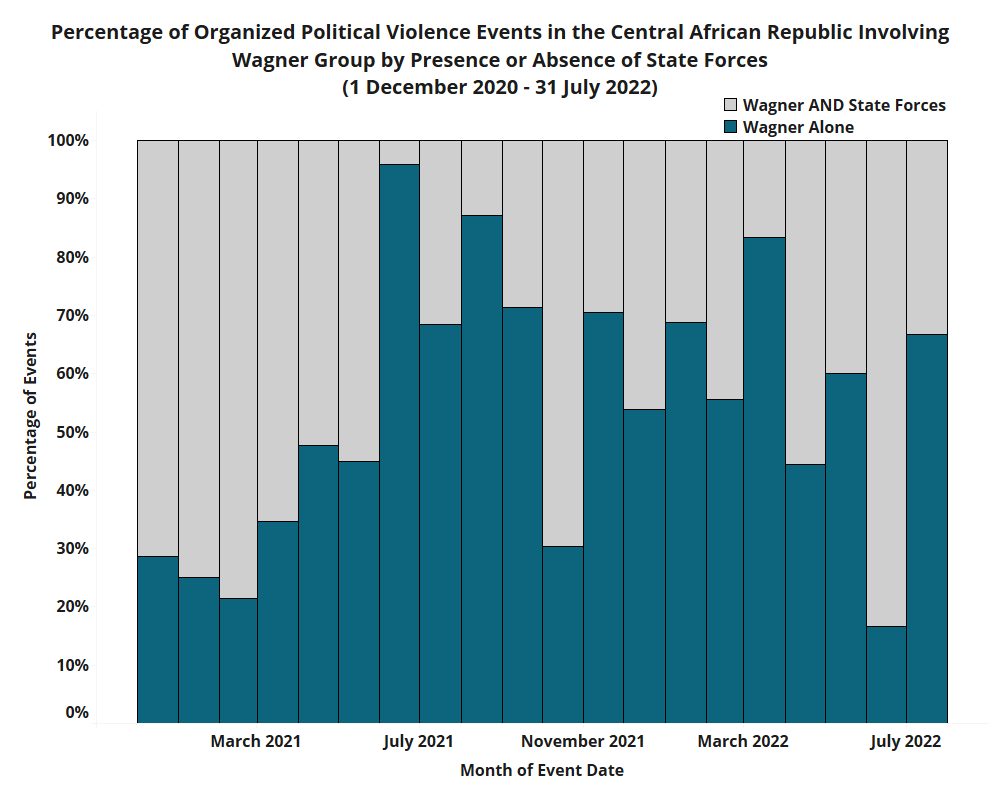
This is not, however, to suggest that the actions of the Wagner Group have been completely divorced from the state. Multiple reports point to the continuing role that Wagner forces play in both the training and coordination of FACA activities (EURACTIV, 27 December 2021; OHCHR, 27 October 2021). As part of this activity, Wagner forces have also engaged in disciplinary action against FACA soldiers. This included the arrest of dozens of FACA soldiers in Bouar on 8 June for abandoning their army posts in Ngaoukala and Hassana, and the torture and killing of a FACA soldier in Boda for excessive alcohol consumption.
This divergence in activity suggests that Wagner forces have taken on a different role in supporting the expression of state control. Much of this, in place of clashes with rebel forces, has focused on exerting control over civilian populations in previously rebel-held areas, through operations targeting communities accused of supporting rebel forces and opportunistic attacks for apparent individual gain.
Heightened Civilian Targeting by the Wagner Group
In March and October 2021, a UN group of experts raised concerns about human rights abuses by the Wagner Group (OHCHR, 31 March 2021; 27 October 2021). ACLED data support these concerns. Since December 2020, ACLED records 180 civilian targeting events involving Wagner mercenaries, equating to 52% of total Wagner Group engagement in organized political violence in CAR. This is a higher rate of civilian targeting than both the FACA — 26% of political violence events — and the CPC — 42% of political violence events — during this same period.
Significantly, when Wagner mercenaries operated independently of state forces, civilian targeting made up 70% of political violence events in the period since December 2020 (see graph below). This figure falls to 27% for Wagner activity alongside state forces.
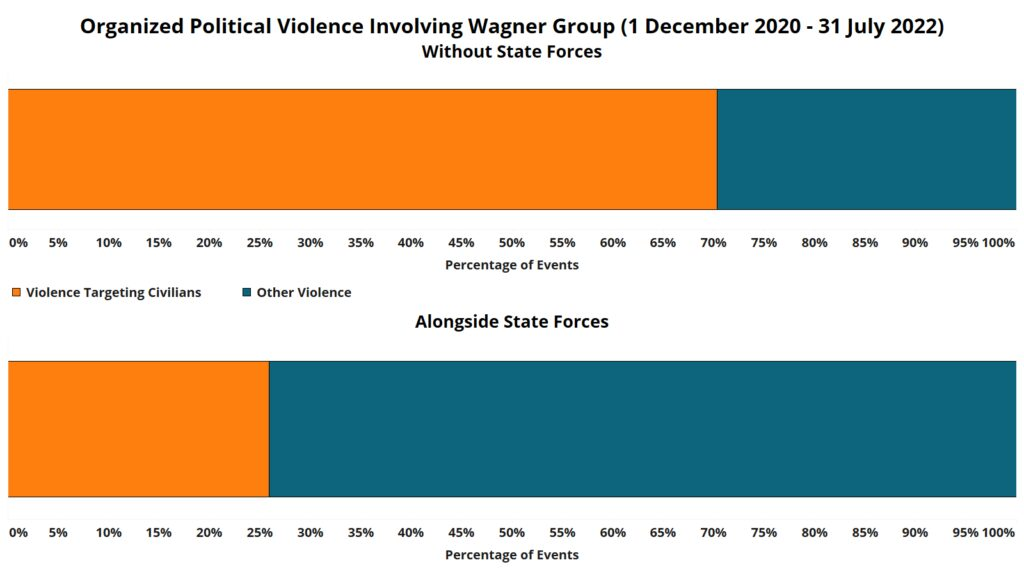
Amidst the broader targeting of civilians, Muslim and ethnic Fulani civilians have drawn particular attention from the Wagner Group (International Crisis Group, 3 December 2021). ACLED records dozens of events in which the Wagner Group has directly targeted Fulani communities. Wagner Group mercenaries have targeted Fulani communities on reported suspicion of collaboration with CPC-affiliated armed groups (RFI, 3 May 2021). These include mass killing events in Nana-Mambere, Ouham-Pende, and Ouaka prefectures. In September 2021, Wagner mercenaries attacked a Fulani community in Besson, Nana-Mambere prefecture, killing at least 40 people. Several CPC-affiliated militias — such as the UPC and RRR — maintain close ties with Fulani communities in CAR (International Institute for Strategic Studies, 2021).
Wagner forces have also regularly engaged in opportunistic attacks against civilian populations, including sexual violence and robberies, as well as looting houses, shops, mines, and marketplaces. While these attacks provide individual gain for perpetrating mercenaries, they also fit into a wider pattern of behavior focused on exerting control over populations through violence.
The Wagner Group’s engagement in heightened levels of civilian targeting when operating independently of state forces may be linked to the international community’s active role in supporting the CAR government and FACA. MINUSCA and the Rwandan military, critical partners in CAR, have voiced concern about abuses committed by the Wagner Group (UN Info, 31 March 2021; Corbeau News, 13 June 2021), and MINUSCA has suffered reputational damage from its operations alongside Wagner mercenaries amid responses to apparent human rights violations by the international community, including the UN and the EU.
The Wagner Group in Mali
Wagner forces began operating in Mali at the end of 2021 amid a pivot away from traditional international partners by the Malian military junta following the coup in May. In June 2021, citing the coup, France moved to reduce their military presence in Mali and end joint operations with Malian state forces (BBC, 3 June 2021; Al Jazeera, 3 May 2022). In January 2022, tensions with traditional partners further escalated after the Economic Community of West African States (ECOWAS) imposed fresh sanctions on Mali (Al Jazeera, 9 January 2022). Mali retaliated by denying international forces access to its airspace (DW, 20 January 2022), expelling Danish troops (Al Jazeera, 27 January 2022; Anadolu Agency, 21 January 2022), and expelling the French ambassador to Mali (Reuters, 31 January 2022). France announced the withdrawal of forces in February 2022 before Mali announced in early May that it would withdraw from long-term defense accords with France (France24, 17 February 2022; 3 May 2022).
Mali’s shift away from traditional security partners also coincided with a move by the Malian military (FAMa) to scale up operations against Islamist militants. The refocus came after FAMa pulled back from operations against Islamist militant groups throughout most of 2021 (for more, see ACLED’s 10 Conflicts to Worry About in 2022: The Sahel). Wagner has played a significant role in the escalation of this activity.
Amid increased military operations, Wagner and FAMa have engaged in multiple deadly attacks targeting civilians. The Wagner Group has been involved in attacks targeting civilians in Mopti, Segou, Tombouctou, and Koulikoro regions (see map below), which are core areas of the Al Qaeda-affiliated Jama’at Nusrat al-Islam wal-Muslimin (JNIM). ACLED records nearly 500 civilian fatalities from these attacks, including the massacre of hundreds of civilians in Moura in the Mopti region in late March 2022. Overall, 71% of Wagner’s engagement in political violence in Mali has taken the form of violence targeting civilians.
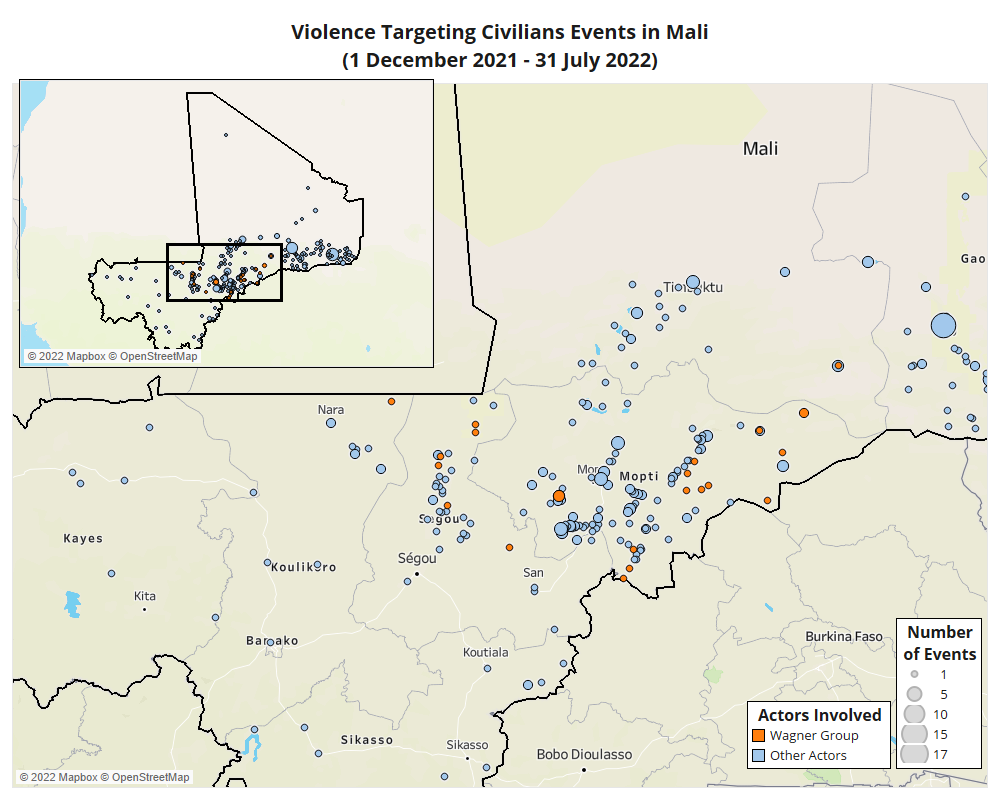
Malian government forces have regularly attacked civilians since the crisis began. However, the distinction between civilians and combatants is increasingly blurred during operations between FAMa and Wagner, as evidenced by the multi-day massacre in Moura and several other events. Mali’s transitional authorities are attempting to create a new set of facts on the ground amid indiscriminate attacks on civilians. The narrative they have developed centers on FAMa’s “rise in power” (montée en puissance), expressed in declarations of unprecedented counter-militancy successes (Le Monde, 3 March 2022).
FAMa asserts respect for human rights and international humanitarian law while systematically denying frequent allegations that civilians have been targeted (France24, 31 May 2022). Allegations of abuses and summary executions are regularly dismissed as untrue or as part of a disinformation war against Mali. On the contrary, disinformation has skyrocketed with the arrival of Russian partners. France claims to have foiled an attempt by Wagner to stage a mass grave near the town of Gossi to discredit French forces, claiming the bodies were left behind after the French handed over the military camp in Gossi to FAMa (Le Monde, 23 April 2022).
Wagner’s involvement helps create a climate of fear, as criticism of FAMa, questioning its “rise in power” narrative, or reporting on Wagner is tacitly forbidden, and Malian authorities flatly deny the mere presence of Wagner (RFI, 21 April 2022). In addition to negatively affecting conflict dynamics and influencing the information environment, Wagner also introduced tactics not previously used by Malian government forces and their allies. For example, in May 2022, ACLED records the first incident in which FAMa and Wagner used booby traps in the central Mopti region. This mirrors prior behavior in both CAR and Libya (The Guardian, 26 May 2022).
Attacks on civilians by the Wagner Group have primarily targeted Fulani communities. In much the same way as the Fulani community in CAR, Wagner and state force targeting of Fulani communities in Mali has been driven by their perceived links to armed groups. Most notably, the Fulani have been stigmatized for their perceived links to Islamist militancy through JNIM and its affiliates (for more, see Sahel 2021: Communal Wars, Broken Ceasefires, and Shifting Frontlines).
In contrast to Wagner Group activity, civilian targeting makes up less than 20% of total state engagement in political violence during the same period. Despite this, operations alongside Wagner mercenaries have driven a spike in civilian targeting events involving state forces. In March 2022, ACLED records the highest levels of civilian targeting involving state forces since early 2020, when state forces killed dozens of civilians during counter-insurgency operations (for more, see ACLED’s report on State Atrocities in the Sahel). Significantly, operations alongside the Wagner Group have also seen civilian fatalities involving state forces jump to levels far exceeding those in early 2020 (see graph below).
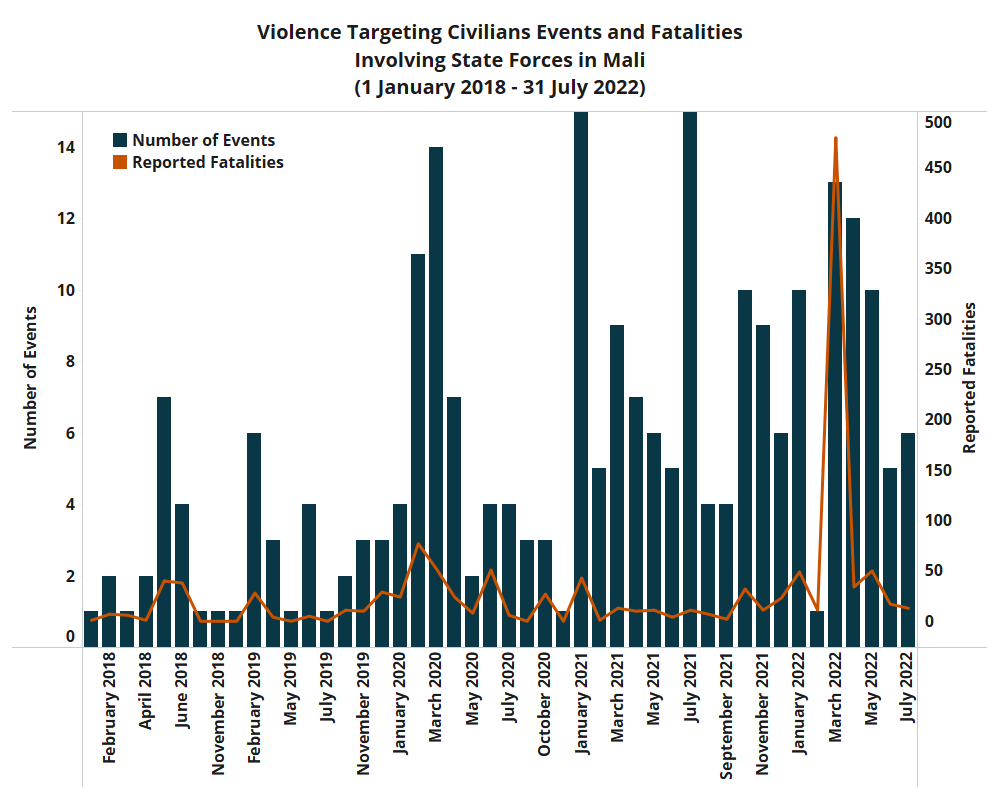
That the Wagner Group perpetrates the majority of its civilian targeting alongside state forces represents a substantially different dynamic to the CAR context, in which the majority of Wagner civilian targeting events exclude state forces. The decision by Malian state forces to continue to operate and perpetrate violence targeting civilians alongside the Wagner Group is indicative of their reduced reliance on traditional military partners, which have publicly raised concerns about Wagner Group abuses (France24, 22 April 2022). Moreover, the military junta has actively impeded MINUSMA operations in Mali, having imposed a no-fly zone in large parts of the country and restricting on-ground movements (Africanews, 20 May 2022).
Recent events may also point to a potentially worrying new trend: Wagner engagement in civilian targeting independent of state forces. On 3 May, Wagner forces operating independently of state forces raided the Tuareg village of Lougui in Segou, pillaged the market, and seized belongings. One week later, on 10 May, Wagner mercenaries abducted five people at the market in Hombori in the Mopti region. Whether such events will become more widespread, as has been the case in CAR, remains to be seen. One thing is clear, the Russian mercenaries’ footprint in Mali is expanding fast as Wagner has established bases or a permanent presence in several central and northern regions of the country. They have also conducted their first operations in the northern regions of Gao and Menaka (Twitter @julesdhl, 24 July 2022). So far, however, they appear to be conducting these operations with more restraint than observed in Mali’s central regions.
Looking Forward
The Wagner Group’s role in ongoing conflicts in CAR and Mali provides some of the clearest insights into how the group operates. In both contexts, Wagner mercenaries have engaged in heightened levels of civilian targeting when compared with state forces. Where civilian targeting forms an integral part of state approaches to counter-insurgency, Wagner mercenaries provide a useful foil for states, deflecting attention away from abuses committed by state forces. In both contexts, they have actively targeted civilians from communities — most notably, ethnic Fulani communities — stigmatized for their perceived connections with armed insurgencies.
While Wagner mercenaries have consistently engaged in heightened levels of civilian targeting in both CAR and Mali, their operations have varied in other ways. The Wagner Group has largely committed civilian targeting alongside state forces in Mali. In contrast, the Wagner Group has most readily engaged in civilian targeting in CAR when operating separately from state forces.
This contrast reflects the differing approaches by the Malian and CAR governments to the international community in recent times. Since Wagner mercenaries began operating in December 2021, the Malian military junta has actively distanced itself from — and in turn, been distanced by — traditional security partners. Many of these same parties — most notably member states of the EU — have been critical of Wagner’s engagement in human rights abuses. With their reduced significance in Mali, the need for the Malian government to respond to such criticism is minimal. In contrast, CAR President Touadéra has called for greater international intervention and support (The Africa Report, 24 September 2021), with the government remaining heavily reliant on Western donors (International Crisis Group, 3 December 2021).
Although the Wagner Group’s deployment in Mali is still relatively new, Wagner has already significantly impacted an already complex conflict environment. During the first six months of Wagner’s deployment in Mali, it became apparent that the group’s operations negatively impacted conflict dynamics, particularly civilian safety. As in CAR, Wagner’s deployment has entailed mass atrocities, torture, summary executions, looting, the introduction of booby traps as a counter-insurgency tactic, and influence operations in the information environment. As Wagner gradually expands its footprint, there is a high risk that other regions will see developments similar to those in central Mali and neighboring areas.
 Eurasia Press & News
Eurasia Press & News



